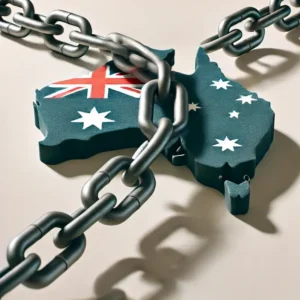Description
Australias role in military alliances poses risks to sovereignty. Discover how AUKUS and BRICS impact Australia’s independence and security.
Australias Role in Military Alliances and Financial Alliances
Navigating Risks and Sovereignty
Australias role in military alliances and position in global military and financial systems has sparked intense debate. With deeper ties to U.S.-led military alliances, Australia’s sovereignty, economic stability, and security face growing questions. This article explores how Australias role in military alliances through AUKUS and its financial alignment with Western powers affect its autonomy, and considers how aligning with emerging economies in BRICS could provide a more balanced and sovereign path forward.
Military and Economic Dependence Risks for Australia
The ‘Brisbane Line’ Redux: Australia’s Military Role in AUKUS
 Australias role in military alliances with the United States and United Kingdom, through the AUKUS pact, has seen Australia take on significant strategic responsibilities. AUKUS strengthens Australia’s military capacity, but it also intensifies its role as a potential staging ground for future conflicts in the Indo-Pacific region.
Australias role in military alliances with the United States and United Kingdom, through the AUKUS pact, has seen Australia take on significant strategic responsibilities. AUKUS strengthens Australia’s military capacity, but it also intensifies its role as a potential staging ground for future conflicts in the Indo-Pacific region.
This positioning is reminiscent of the historical ‘Brisbane Line’ in WWII, where parts of Northern Australia were seen as disposable in defence plans. Today, the U.S. divides Australia into three zones for strategic purposes:
1. Zone 1: Northern Australia for U.S. force projection.
2. Zone 2: Central Australia as a logistics hub.
3. Zone 3: Southern Australia for industrial and munitions production.
Financial Commitments Under AUKUS and the “No-Refund Policy”
Australia has committed an estimated AUD $368 billion for submarines under AUKUS. However, a “no-refund” policy means that even if the U.S. fails to deliver submarines, Australia would still be financially responsible. This financial burden raises concerns about Australia’s economic autonomy and public spending priorities.
Economic and Security Concerns
This financial dependency extends beyond hardware, with Australia agreeing to resource and industry allocations that make it a ‘resource base’ for U.S. and UK strategic interests. The Pentagon’s plans for Australia risk positioning the country as a proxy in global conflicts, making Australia a likely target rather than a protected ally.
Former Ambassador John Lander recently warned that Australia’s close alignment with U.S. military strategy puts the nation at greater risk of becoming a target, especially with Australia’s defence capabilities primarily serving U.S. interests.
Heightened Dependency and Lack of Sovereignty
The Strategic Bullseye on Australia’s Back

Australia’s role within AUKUS places it at the frontline in any Indo-Pacific conflicts, particularly with China. U.S. forces in Northern Australia, including B52 bombers, along with expansion plans for nuclear submarines and airbases, indicate that Australia could be a primary target in regional conflicts. This heightened military presence is often viewed as an increase in security; however, without a formal U.S. commitment to defend Australia, it primarily serves U.S. strategic interests rather than Australian security.
Financial Control and Dependency on Western Systems
Australia’s financial dependency on Western institutions also impacts its sovereignty. The dominance of the U.S. dollar in global trade creates risks of financial sanctions, restrictions, and compliance pressures. If Australia were to engage with BRICS or pursue independent financial structures, it would need to challenge entrenched dependencies on the U.S. financial system.
The BRICS bloc’s development of a Central Bank Digital Currency (CBDC) as a peer-to-peer settlement system offers a glimpse of potential independence from Western financial dominance, an area where Australia could consider involvement.
National Integrity at Stake
Australia’s alignment with AUKUS and its reliance on Western financial systems significantly impact its ability to act as a truly independent nation. By aligning its military strategy so closely with U.S. and UK interests, Australia risks becoming a subordinate player in global politics rather than an equal partner. This alignment has practical, cultural, and strategic repercussions that affect Australia’s sovereignty and national integrity in several ways:
1. Erosion of Independent Foreign Policy
Australia’s close military alignment with AUKUS has led to policies that prioritize U.S. and UK security interests over our own. For instance, by hosting U.S. military bases and committing to support Western-led missions, Australia effectively cedes a portion of its decision-making power. This dependency creates situations where Australia could be drawn into conflicts in which it has no direct stake, simply due to its obligations within AUKUS.
The lack of an independent foreign policy restricts Australia’s ability to act autonomously on the world stage, diminishing its ability to cultivate neutral or strategic alliances, particularly with Asia-Pacific neighbors.
2. Economic Control Through Military Spending
The heavy investment in AUKUS-related defence projects also diverts public money from domestic needs, such as healthcare, education, and infrastructure, toward costly military equipment and foreign defence contracts. This commitment to defence spending on U.S. and UK equipment and technologies, under a “no-refund” policy, means that funds are not only spent abroad but also locked into foreign priorities.
The significant budget allocation to defence spending risks increasing public debt and reliance on international finance, reducing Australia’s ability to prioritize national economic growth and resilience in critical areas like public services and renewable energy.
3. Public Discontent and Regional Divisions
The perception that Australia is becoming a “51st state” of the U.S. has stirred public discontent, particularly in regions like the Northern Territory. Communities in these areas are becoming increasingly vocal about their concerns, as U.S. military presence expands and local industries shift to meet the needs of AUKUS.
This growing divide could lead to regional resistance and political division, with parts of the population questioning whether national interests are being sacrificed for foreign agendas. The Northern Territory’s proximity to U.S. military bases makes it more vulnerable, fueling concerns about Australia’s security, safety, and true autonomy.
4. Risks to National Security
Aligning with U.S.-led military strategies also increases Australia’s visibility as a target in global conflicts. The deployment of U.S. bombers, submarines, and other assets on Australian soil sends a clear message to other global powers, particularly in the Indo-Pacific region, that Australia is an integral part of the U.S. strategic network.
This positioning heightens security risks, as adversaries may view Australia as a proxy or extension of U.S. military might. Without strong guarantees that the U.S. will defend Australia in times of crisis, this arrangement leaves Australia exposed, potentially compromising its safety and national integrity.
5. Limited Diplomatic Flexibility
Australia’s involvement in AUKUS places constraints on its diplomatic options with non-Western nations. While Australia shares strong historical ties with the U.S. and UK, its geographic location in the Asia-Pacific region means that cultivating balanced relationships with its neighbors is critical for long-term security and trade.
However, heavy alignment with U.S. policies can limit Australia’s ability to negotiate and act independently with other countries, especially those in Asia. This restricted diplomatic flexibility could result in missed economic opportunities and a reduced role in regional affairs, affecting Australia’s standing as an independent and respected voice in the Indo-Pacific.
6. Cultural Influence and National Identity
With the U.S. influence embedded in military, economic, and even political spheres, Australia’s cultural and political identity risks becoming increasingly intertwined with that of its Western allies. This close association may dilute Australia’s own distinct identity and values, which are rooted in its unique multicultural society and Pacific heritage.
For Australia to maintain its integrity as a sovereign nation, it must carefully balance its global alliances with policies that reflect its unique cultural identity and support the well-being of its diverse population.
Reclaiming Sovereignty and National Integrity
To preserve its national integrity, Australia must reassess its commitments within AUKUS and consider alternative pathways that reinforce its autonomy and reflect the needs and values of its citizens. By fostering balanced international relationships and investing in self-sufficient economic and defense policies, Australia can retain its sovereignty, ensuring its security and prosperity remain guided by national, not foreign, interests.
Paths Towards Sovereign Independence and Economic Stability
Re-Evaluating Australia’s Role in AUKUS
Australia can begin by reassessing its commitments within AUKUS. While Australias role in military alliances can strengthen defence capabilities, policies that prioritize Australia’s security over U.S. interests would better serve the nation. Steps Australia could take to limit overreliance on the AUKUS alliance include:
– Developing Independent Defence Strategies: Establish an independent defence policy focusing on protecting Australian territory, not projecting power in alignment with U.S. objectives.
– Maintaining Balanced International Relations: Australia should balance relationships across the Asia-Pacific, rather than relying solely on Western alliances.
– Increasing Transparency and Public Dialogue: Encouraging a national debate about Australia’s involvement in AUKUS can foster a more democratic approach to defence policies.
Exploring Financial Independence through BRICS Collaboration
BRICS offers an alternative framework for economic collaboration that does not rely on the U.S. dollar, reducing dependency on Western financial structures. By observing or participating as an affiliate, Australia could gain insights and potentially benefit from:
– Developing a BRICS-aligned CBDC system: Participation in an international digital currency exchange could reduce the impact of dollar-dominated sanctions.
– Strengthening Regional Economic Ties: Engaging with BRICS countries could open Australia to alternative markets and investment sources, especially in sectors like minerals and energy.
– Expanding Trade Networks: New trade agreements with BRICS nations could enhance exports and reduce dependency on traditional Western markets.
Pursuing an Independent Foreign Policy for Australia
An independent foreign policy would require Australia to reconsider its role in the U.S.-China rivalry and seek a position that maintains peaceful relationships within the Indo-Pacific region. Australia could pursue neutrality in the region’s power dynamics, positioning itself as a mediator or neutral trade partner rather than an adversary.
– Fostering Diplomatic Relations with BRICS Nations: Building stronger ties with BRICS countries could provide economic alternatives and support political neutrality.
– Supporting Multilateral Peace Initiatives: Australia could initiate or support multilateral dialogues aimed at reducing regional tensions.
– Implementing a “National Interest First” Policy: By putting Australia’s national interests at the forefront, policies would focus on security and economic resilience over global influence.
Domestic Economic Policies for Increased Self-Reliance
Australia’s over-reliance on international trade and imported technology makes it vulnerable. Initiatives that promote domestic manufacturing and innovation can enhance resilience and economic independence. Key measures include:
– Investing in Local Industries: Government support for industries critical to national security, such as telecommunications, agriculture, and mineral processing, would reduce external dependency.
– Prioritizing Public Infrastructure: Investment in infrastructure that serves Australian citizens, rather than foreign military interests, could strengthen economic stability and job growth.
– Establishing a National Bank: Reintroducing a publicly owned bank to fund infrastructure and local industry can counterbalance private banking influences and offer affordable financial services to Australians.
Summary: Securing a Sovereign Future for Australia
Australia’s position as a key ally in AUKUS and a participant in U.S.-led financial systems has significant implications for its sovereignty. While these alliances provide certain benefits, they also pose risks to Australia’s autonomy and security. By reassessing Australias role in military alliances, exploring financial partnerships with BRICS, and developing a national interest-centred foreign policy, Australia can work towards greater sovereignty and stability.
Thought-Provoking Question
Do you think Australias role in military alliances serve its best interests, or do they put the nation at greater risk?
Call to Action
If you found this article insightful, explore more about political reform and Australia’s monetary sovereignty on Social Justice in Australia: https://socialjusticeaustralia.com.au/. Share this article with your community to help drive the conversation toward a more just and equal society.
Click on our “Reader Feedback” menu. Let us know how our content has inspired you. Submit your testimonial and help shape the conversation today!
Additionally, leave a comment about this article below.
Reference:
The map that Canberra doesn’t want you to see: https://www.afr.com/policy/foreign-affairs/three-key-zones-how-the-pentagon-sees-australia-20241022-p5kk5w
Assange Father Blasts US Policy on Afghanistan, Defends Australian Military Whistleblower: https://youtu.be/05Vm9rWmGIo


What is the name of the British author who recently published a book on the Australian Defence Department, the AUKUS deal and the imbedding in the Defence Department of US ‘advisers, contractors,’etc. He was featured on LNL (ABCRN) in one of Philip Adams’ last interviews a few months age before hanging up his mic.
Hi Bruce,
This is all I can find about David Edgerton. There is no record of this interview on ABC Radio National. Maybe it was removed for political reasons.
British author David Edgerton recently discussed his book “The Rise and Fall of the British Nation” on ABC Radio National’s “Late Night Live” with Philip Adams. In one of Adams’ final interviews before retiring, Edgerton explored themes related to the AUKUS agreement and the integration of U.S. advisers and contractors within the Australian Defence Department. His work provides a historical perspective on Britain’s industrial and military evolution, offering insights into contemporary defence collaborations.
Here is a review of Davids book: https://www.theguardian.com/books/2018/jun/16/the-rise-and-fall-of-the-british-nation-and-these-islands-review